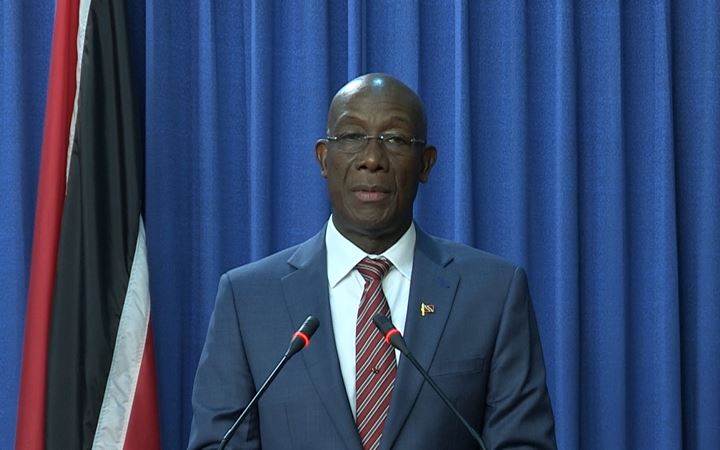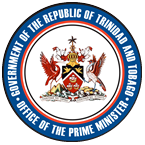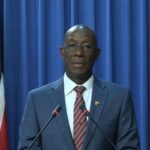- 26 SEP 2020
Prime Minister’s statement at the 75th Session of the United Nations General Assembly 2020

Mr. President,
It is an honour to address this august Assembly of States, on this milestone, the 75th Session of the United Nations General Assembly. Allow me at the outset, to extend congratulations to you, Mr. President, on behalf of the Government and People of the Republic of Trinidad and Tobago, on your election as President for this Session. You have the full support of Trinidad and Tobago, as we acknowledge the enormity of your undertaking, especially as we continue to grapple with a global pandemic which has affected us all.
I also wish to express our deepest gratitude to your predecessor, His Excellency Professor Tijani Muhammad Bande for his astute leadership in the 74th session and for successfully guiding the work of the session during the challenging onset of the 2019 Novel Coronavirus pandemic.
Mr. President,
Seventy-five years ago, in the aftermath of the Second World War, the United Nations was created, with the primary objective of saving “succeeding generations from the scourge of war, which had twice in our lifetime brought untold sorrow to mankind.” Undoubtedly, the desire to create the political, social and economic conditions for lasting peace remains as fervent today as it was during the organisation’s genesis in San Francisco. The 75th anniversary of the United Nations presents an ideal opportunity for reflection and introspection on whether we have embraced the opportunities to re-engineer and reinvigorate the mechanisms of multilateralism, to engender the peace, which has so far remained elusive, to advance social progress and to chart the way forward to attain sustainable development, which would benefit all of humanity.
Mr President,
Trinidad and Tobago joined this family of nations in 1962, the year we attained our independence. As a Small Island Developing State, we continue to embrace the principle of collective security enshrined in the Charter as a major safeguard for Small States, where the rule of law, in the absence of military and economic power, sustains their strength and sovereignty. As we mark this 75th anniversary of the United Nations, all States, small and large, can be reasonably proud of some of our achievements under the umbrella of this revered organisation, such as the creation of a roadmap for global sustainable development, advances in the development of international law and the promotion of gender equality.
Throughout the 75 years of the existence of the United Nations, the common thread in the tapestry of our collective action is the recognition that global challenges can best be overcome through the practice of multilateralism based on mutual respect and trust. Now more than ever is the time to demonstrate that true spirit of global partnership and a reaffirmation of the rules-based commitments.
Mr. President,
It is in this context, that I congratulate you on the aptly chosen theme for this 75th session and I welcome the opportunity to address this Assembly and share our perspectives on “The future we want, the United Nations we need: reaffirming our collective commitment to multilateralism-confronting COVID-19 through effective multilateral action.”
Small nations like ours as well as big nations anticipate and even depend on us all sharing and caring for each other.
Mr. President,
Like many other Small Island Developing States (SIDS) around the world contending with the impact of the COVID-19 pandemic, Trinidad and Tobago has had to walk a thin line between saving lives and preserving livelihoods, with limited resources. As a Government, we took the decision to close our borders in March this year, to temporarily halt the conduct of non-essential services and to implement physical distancing requirements, all in an effort to prevent the importation and spread of the virus. Subsequently, additional measures were implemented to the approach to safeguarding the population. Relevant adjustments were also made to address the impending economic consequences to protect the most vulnerable in our society, who would have temporarily lost the wherewithal to support themselves. Our experience thus far bears eloquent testimony of the need for Small Island Developing States to be supported by an enabling international economic environment through business activity and financing, international trade, as well as technical cooperation and, most importantly, multilateralism.
Mr. President,
I take the opportunity to convey my condolences to and express my solidarity with all Member States and all the families of those who have lost loved ones due to the COVID-19 global pandemic. While we mourn the loss of the hundreds of thousands of persons worldwide, to COVID-19, we are greatly concerned with the alarming rate at which the disease continues to affect millions across the globe.
Mr. President,
Trinidad and Tobago commends the leadership role demonstrated by the World Health Organization (WHO) in spearheading the efforts to treat with this plague. We also wish to salute and commend the health care and other frontline workers around the world who continue to work tirelessly, sometimes at significant personal sacrifice, to ensure that those affected by the pandemic receive the best available care.
Mr. President
The COVID-19 pandemic presents an existential threat of unmatched proportions to human health and safety around the world. It has overwhelmed health sectors, disturbed global trade and food supply chains, crushed the travel and leisure industry as well as disrupt the basic livelihoods of people around the world. Alarmingly the pandemic has intensified the vulnerabilities of small economies and has rendered us more susceptible to exogenous shocks. Further, COVID-19 has threatened to reverse the gains, which our societies have achieved towards attaining our sustainable development goal (SDG) targets.
Our prospects for achieving sustainable development hinge heavily on the safety and security of our people. The global pandemic has unfortunately exacerbated the threats posed by the illicit trafficking in small arms and light weapons, piracy, trafficking in persons and cybercrimes. Given our ardent desire to free our society from the effects of the prevalence of unregulated small arms and light weapons, Trinidad and Tobago remains fully committed to the Arms Trade Treaty (ATT) which we view as indispensable in addressing the menace of the illicit arms trade.
As one of the most multi-ethnic and diverse societies in the world, Trinidad and Tobago is cognisant of the value of diversity, mutual respect and the right to live in freedom without fear of persecution. Regrettably, some parts of the world are still afflicted by the absence of tolerance for human rights, dignity and diversity, which has engendered war crimes, crimes of aggression, crimes of genocide and crimes against humanity. Trinidad and Tobago in this regard attaches great importance and remains unwavering in its support of the mandate of the International Criminal Court (ICC), which was established to hold those who commit such heinous crimes accountable under international law and to act as a deterrent to would-be perpetrators. We therefore continue to urge those States, which have not yet done so, to support the ICC.
Mr. President,
The first Prime Minister of Trinidad and Tobago, Dr. Eric Williams, declared, “The future of our nation is in our children’s school bags”. That declaration remains valid to this day and in our country, it is universally accepted that education is the key to success. It is therefore in our best interest to ensure that our nation’s children have both the opportunity and the necessary tools to fulfill their highest potential. The Government of Trinidad and Tobago remains attentive to the needs of all our children, with special emphasis on those who are most affected by this pandemic, such as those living in extreme poverty, those suffering from mental health ailments, those with special needs and those who have lost loved ones. As we navigate through these challenging times, we remain committed to ensuring that no child is left behind in our campaign to “build back better”.
Mr. President,
The COVID-19 pandemic has accelerated my Government’s thrust towards a digital transformation of the public sector. As we adjust to the new normal, we have quickly adapted to utilising remote platforms for conducting business instead of the traditional in-person meetings. We are optimistic that our greater reliance on digital platforms will result in opportunities for our young people in fields related to cyber technology and cyber security.
Mr. President,
It is widely acknowledged that climate change is a threat to our very existence. We are also cognisant that this pernicious threat does not recognise geographical boundaries and will disproportionately impact developing countries, particularly Small Island Developing States (SIDS) and Least Developed Countries (LDCs). As a Small Island Developing State, Trinidad and Tobago remains at high risk of being affected by the harmful effects of climate change which have already been manifested in coastal erosion resulting from the rise in sea level. In this regard, our country continues to place emphasis on multi-pronged approaches for future adaptation to and mitigation of climate change, within the constraints of our limited financial capability. We therefore remain committed to achieving our sustainable development through a combination of collaborative approaches and improved partnerships with stakeholders.
Mr. President,
The COVID-19 pandemic coupled with the significant decreases in energy prices has precipitated the acceleration of our efforts aimed at the diversification of our economy. In this respect, we have allocated resources and increased investment in the agricultural and tourism sectors as we recognise the need to build resilience in these areas through incentives, policies, programmes and public private partnerships. Additionally, engendering investment in agriculture will inevitably lead to a reduction in the demand for certain imported foods, preservation of our limited financial resources and the achievement of a more food-secure nation. We will also continue to encourage the participation of women in agri-business, agriculture and tourism as we remain seized of the fact that women not only undertake the role of ensuring that their families receive the nutrition they need to be healthy but are sometimes the breadwinners.
In this regard, the United Nations Economic Commission for Latin America and the Caribbean (ECLAC), has cautioned that a debt crisis is looming for the economies of the Latin American and Caribbean sub-region, which will compound their high debt to GDP and debt service ratios. Despite the middle and upper-income status of many economies in the region, a strong case exists that these countries are deserving of special consideration for debt relief. We strongly urge the international community to assist with the financial support needed by developing countries, including middle-income countries like Trinidad and Tobago, to meet their development commitments.
The promotion of gender equity and equality is a priority in our National Development Strategy. As a country, we have also remained unwavering in our commitment to the effective implementation of the Beijing Declaration and Platform for Action and have submitted our country’s progress report this year on the twenty-fifth (25th) anniversary of the Declaration. In recognition of the phenomenal contribution of women to peace and development, we are particularly proud to highlight the tenth anniversary of the introduction and main sponsorship by Trinidad and Tobago of the United Nations General Assembly Resolution on ‘Women, Disarmament, Nonproliferation and Arms Control.’
Mr. President,
The marine environment and its resources remain critical to the livelihood of the people of Trinidad and Tobago, and to our sustainable development. Governance of our oceans continues to be a priority. Unfortunately, as a result of the global pandemic, the fourth session of the Intergovernmental Conference on an International Legally Binding Instrument under the United Nations Convention on the Law of the Sea on the Conservation and Sustainable Use of Marine Biological Diversity of Areas Beyond National Jurisdiction, had to be postponed. Given the critical stage of the negotiations, Trinidad and Tobago remains hopeful for its early resumption, the successful completion of which would redound to the benefit of all humankind.
Mr. President,
Trinidad and Tobago continues to support the reform of the Security Council. We are firm in our view that this will improve significantly the global ability to effectively respond to the various security and other challenges, which currently confront the international community. While we acknowledge that in its seventy-five-year history the United Nations has succeeded in preventing another global war, peace remains out of reach in some parts of the world. In order to be effective, we believe that the United Nations must adapt to the ever-changing geopolitical environment and that the Security Council ought to reflect the diversity that characterises and truly represents the United Nations.
As we begin the Decade of Action and Delivery to implement the Sustainable Development Goals it is important to ensure that no country is left behind. It is on this note that we maintain that the economic, commercial and financial embargo imposed against Cuba, undermines the country’s potential to achieve sustainable development. To this end, Trinidad and Tobago reiterates its call for the unconditional lifting of the economic, commercial and financial embargo against Cuba. We have noted that despite the blockade, the Government of Cuba has demonstrated the true spirit of multilateralism by providing health care personnel to assist countries in different regions of the world in their fight against COVID-19. We commend and thank the Government and People of Cuba for this humanitarian gesture.
In furtherance of this same spirit, we ask the Member nations of the UN to continue to support the CARICOM initiatives, encouraged by Norway and Barbados, to bring all elements in Venezuela to accept dialogue and human rights as their guiding lights as we look forward to fair and peaceful elections there in the near future and trust that a satisfactory outcome would lead to a resumption of normalcy in our Caribbean shores as we all aspire together to achieve together in this region.
Mr. President,
As the United Nations commemorates its 75th anniversary, it is indeed opportune to reaffirm its founders’ guiding vision as enshrined in the Charter and to rededicate ourselves to be steadfast in our joint pursuit of the goals of upholding Human Rights, Development, Peace and Security. However, as we assess the performance and impact of the United Nations and the road we have travelled, we must also look ahead to the next phase in the life of our organization, given the many challenges which confront our global community. I am confident that by working together we can achieve success.
Mr President,
Members all, I thank you.






